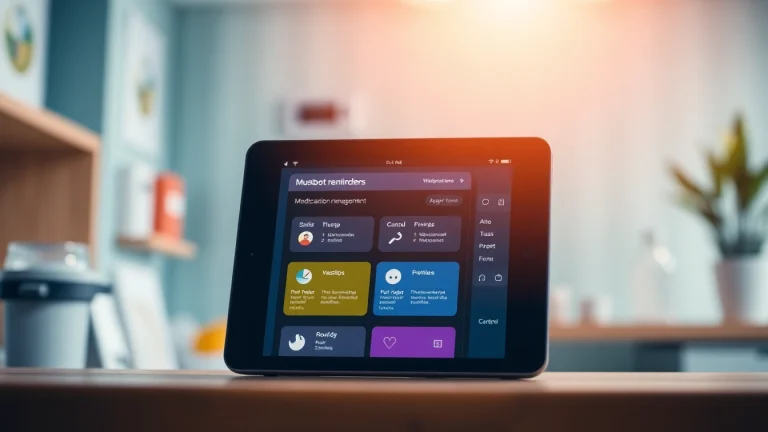
Maximize Your Health with the Top Medication Management App: Features, Benefits & Tips
Understanding Medication Management
What is a Medication Management App?
A medication management app is a digital tool designed to help users track their medication schedules, dosages, and refills. These applications are typically available on smartphones and tablets, enabling users to stay organized and reminded about their medications. By utilizing a medication management app, patients can receive timely alerts, manage multiple medications, and monitor their adherence to prescribed therapy, ultimately improving their health outcomes.
Importance of Proper Medication Adherence
Medication adherence—the degree to which a patient follows their prescribed treatment regimen—is critical for effective healthcare. Studies have shown that nearly 50% of patients do not take their medications as prescribed, leading to worsening health outcomes and increasing healthcare costs. Medication management apps play a pivotal role in addressing this issue by offering features that promote adherence, such as reminders, tracking options, and educational content about medications. Proper medication management not only helps in managing chronic diseases but also significantly reduces hospitalizations and medical complications.
Key Features to Look For
When selecting a medication management app, it’s important to consider the following key features:
- Reminder Alerts: Users should receive customizable notifications for medication doses, helping to encourage adherence.
- Medication Database: The app should contain a comprehensive database of medications that includes information on side effects, interactions, and dosage details.
- Personalized Health Tracking: Features that allow users to log health metrics, such as blood pressure or glucose levels, can facilitate a holistic view of their health.
- Multi-User Support: An app that allows caregivers to manage medications for multiple individuals can be beneficial for families and caretakers.
- Prescription Refill Notifications: Timely alerts for refills help avoid gaps in medication supply.
- Data Security: Ensure that the app follows stringent data protection standards to secure personal health information.
Exploring the Best Medication Management Apps
Comparative Review of Popular Apps
In the growing market of medication management apps, several stand out due to their unique features and widespread user adoption. Medisafe and MyTherapy, for instance, are among the most recognized apps globally. Medisafe provides engaging visuals and a robust social support system that allows users to connect with loved ones for medication reminders. Meanwhile, MyTherapy offers a comprehensive suite of health tracking features, making it easy for users to monitor adherence alongside other health metrics.
User Ratings and Feedback Analysis
User feedback is invaluable when assessing medication management apps. For example, Medisafe boasts an impressive rating of 4.7 on the App Store with nearly 94,000 ratings, indicating a high level of user satisfaction. Commonly praised features include its user-friendly interface and the ability to track multiple medications easily. In contrast, MyTherapy has received a 4.8-star rating, with users appreciating its comprehensive health tracking capabilities. Detailed reviews often highlight the importance of these features in real-world scenarios, such as complex medication regimens for chronic disease management.
Unique Features of Each App
Every medication management app has distinct features that cater to different user needs:
- Medisafe: Offers an intuitive interface with engaging visuals, customizable reminders, and a built-in community feature for social support.
- MyTherapy: Includes logging options for health metrics, integration with wearables, and comprehensive reports that can be shared with healthcare providers.
- Pill Reminder: Focuses on simplicity, offering free notifications and straightforward medication tracking without extensive additional features.
How to Use a Medication Management App Effectively
Setting Up Your Account and Medication List
Getting started with a medication management app begins with creating an account and inputting your medication list. Users should provide details such as the name of the medication, dosage, frequency, and any specific instructions (e.g., take with food). Many apps allow users to scan the medication barcode for quicker entry. It is crucial to ensure all information is accurate; this sets the foundation for effective reminders and tracking.
Creating Effective Reminders
Creating effective reminders is central to the utility of any medication management app. Users should customize alerts that suit their schedules—whether through push notifications, text messages, or emails. Preferred reminder times can be set based on personal routines, and users might benefit from additional notifications for refills or follow-up medical appointments. Utilizing diverse reminder formats (auditory, visual) may enhance adherence, as different people respond to different cues.
Tracking and Monitoring Your Progress
Monitoring your medication adherence and overall health is vital in recognizing patterns and areas for improvement. Most medication management apps provide insights through graphical representations of adherence rates and other health metrics. Users should regularly check these statistics and discuss any concerns with healthcare providers. Tracking can also enable users to become more engaged with their health, leading to better long-term outcomes.
Common Challenges with Medication Management
Overcoming Forgetfulness
Forgetfulness is a significant barrier to medication adherence. Medication management apps tackle this challenge by offering customizable reminders to help users remember their doses. Additionally, users can engage family members or caregivers in the reminder process for added accountability. Implementing a routine (e.g., taking medications at the same time as another daily habit) can also help improve consistency.
Managing Multiple Medications
For individuals on multiple medications, keeping track of various doses, timings, and refill schedules can be daunting. Medication management apps simplify this process by compiling all medications in one place, allowing users to view their complete schedules at a glance. Advanced features like drug interaction checks can also alert users to potential conflicts between medications, supporting safer management of their regimens.
Addressing User Anxiety and App Usage
Some users may feel overwhelmed by technology or anxious about managing their medications through an app. To alleviate these worries, many apps provide user-friendly interfaces and robust support with tutorials and customer service. Encouraging gradual usage—starting with basic features before exploring advanced options—can also help increase comfort levels. Furthermore, utilizing features like progress tracking can boost users’ confidence as they witness their improved adherence over time.
Future of Medication Management Technology
Emerging Trends in Digital Health
Technology in healthcare continues to evolve, with emerging trends shaping the future of medication management. Increased integration of telehealth services allows patients to consult healthcare professionals directly through apps, providing immediate feedback on adherence and health status. Wearable technologies, such as smartwatches, are anticipated to integrate more closely with medication management apps, enabling seamless tracking of health metrics in real-time.
The Role of AI in Medication Management Apps
Artificial Intelligence is poised to revolutionize medication management apps by offering personalized recommendations and predictive analytics. For instance, AI algorithms can analyze user behaviors to suggest optimal reminder settings, adjust protocols based on adherence patterns, and provide tailored health insights. Additionally, AI could enhance drug interaction alerts through improved data processing capabilities, resulting in more accurate warnings for users.
Predictions for User Experience Enhancements
As technology advances, user experience for medication management apps is expected to improve significantly. Enhanced user interfaces that prioritize accessibility will provide a smoother experience for all demographics, including the elderly or technology-averse users. Furthermore, as data privacy and security concerns remain paramount, developers are likely to focus on creating secure platforms that protect user data while maintaining functionality. Future versions of these apps may also utilize augmented reality for medication identification, further enriching usability.


